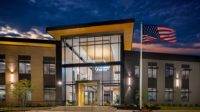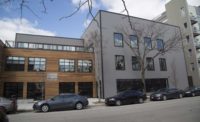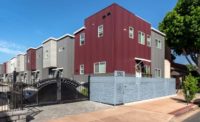A state of the art medical facility required an appearance to match, blending bricks and glass, as well as composite panels from Citadel Architectural Products.
The St. Thomas Medical Office Building in Jasper, Ind., for treatment and rehab maximizes the practice’s strengths to best serve existing and potential patients. The 56,000-square-foot building houses Memorial Hospital’s Outpatient Surgery Center and Outpatient MRI Suite along with the offices of two urologists. On the second floor, there is a medical office/physical therapy suite featuring a HydroWorx pool for hydrotherapy. The second floor is also home to St. Thomas Chapel.
“The design played off the look of the existing hospital,” says Brent Davis, principal at CSO Architects in Indianapolis. “The doctor that owns the building wanted a modern looking building as opposed to a traditional look.”
Davis chose the panel because it’s readily available, economical and offers the desired aesthetic for this project. “There’s not a huge lead time compared to other composite panel companies, especially if you’re working with their standard product line,” Davis says. “This project was a simple mixture of exterior materials. The biggest thing we had to deal with was the grade drop of approximately 30 feet going from the north to the south of the building, but the different materials helped tie it together.”
A total of 4,880 square-feet of Panel 20 was installed on the St. Thomas Medical Office Building. The product is a composite panel for exterior use made by bonding an aluminum skin to a substrate of thermoset phenolic resin. A second aluminum skin is added as a backer and provides thermal stability and panel balance. The product is impact resistant, water resistant and provides smoothness in a wide variety of finishes.
David Lee, president of B&L Roofing and Sheet Metal, says the panel uses a two-piece molding system that installs securely and simply. “We installed it as an accent between floors, above and around windows,” he says. “We also installed it as part of a canopy system at entrances.”
“It’s a flush-mount system,” Lee says. “You insert the panel into a J at the bottom and on the sides the H moldings attach the system to the substrate. Then you slide the H moldings on the top and secure them, so there are no exposed fasteners. It’s installed over a vapor barrier so you don’t have to worry about moisture behind the system.”
No exposed fasteners means a clean metallic look for the modern medical facility.





